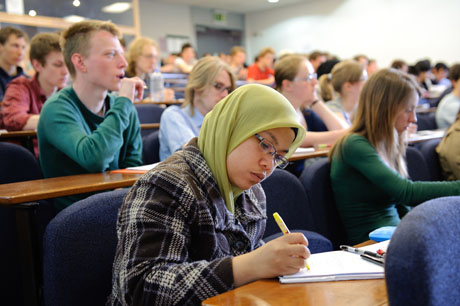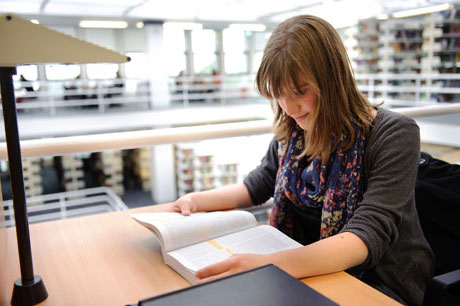View semester dates

BSc (Hons) Mathematics and Philosophy
The cross-section of rationale and belief
Year of entry: 2026/27
View semester dates
For thousands of years, maths and philosophy have occupied the same ground.
From Pythagoras to Bertrand Russell, both disciplines developed in their own ways, but remained naturally related to each other. Our contemporary maths and philosophy degree applies that marriage of logic and analytical reasoning to solve quantifiable problems, to question traditional assumptions and to develop clear and articulate understandings of complex issues.

Something I have utilised a lot since coming to York is the resources the University has for students. The library has a collection of resources for our number crunching brains, along with a Maths Study Skills Centre which offers advice and guidance on maths topics. University allows you to learn to be independent without ever having to go through difficult things on your own.
Course content
University maths is about studying patterns in numbers, geometry and many other abstract concepts. It's also about applying those concepts in practical problem-solving.
Philosophy is not a body of knowledge, but an activity: the activity of seeking a reflective understanding of ourselves and of the natural and social worlds we inhabit. Your maths and philosophy degree will reflect that body of knowledge and range of thinking.
Year 1
You'll establish your base with introductory maths and philosophy classes during your first year.
Mathematics modules
Philosophy modules
Academic integrity module
In addition to the above you will also need to complete our online Academic Integrity module.
Year 2
After establishing your basic mathematics, you'll take more advanced courses.
Core modules:
Option modules:
You will study two option modules, one per semester. Examples can be found below. Some option module combinations may not be possible. The options available to you will be confirmed after you begin your course.
- Aesthetics
- Applied Ethics
- Being and Reason: Spinoza's Metaphysics
- Ethical Theory
- Knowledge and the Social Sciences
- Logic and Paradox
- Love, Law, and Solidarity: Recognition from Rousseau to Honneth
- Metaphysics
- Politics and Freedom: Anarchism and Conservatism
- Philosophy of Mind
- Philosophy of Language
- Philosophy of Science
- Religious Ethics
- The Limits of Reason: Kant's Theoretical and Practical Philosophy
These will help you to develop the knowledge, understanding and skills that you'll use in more specialised investigations in your third year.
Year 3
In your final year, you can choose to take an Extended Independent Project in Maths or Long Dissertation in Philosophy. Alternatively you can take a Short Dissertation in Philosophy.
Core modules
Option modules
You will study three or four option modules. Examples can be found below. Some option module combinations may not be possible. The options available to you will be confirmed after you begin your course.
Mathematics
- Groups, Actions and Galois Theory
- Measure and Integration
- Topology
- Number Theory
- Cryptography
- Operations Research
- Numerical Analysis
Philosophy
- Action and Agency
- Buddhism as Philosophy
- Causation and Laws
- Cognitive Anomalies, Decision-Making and Democracy
- Consciousness
- Contemporary Issues in Bioethics
- Experimental Philosophy: The Psychology of Philosophy
- Foundations of Maths
- German Idealism: Moral, Legal & Political Philosophy
- Happiness, Utility and Wellbeing
- Philosophy of Physics
- Mind and Morality
- Nine Art Works, Nine Philosophical Problems
- Philosophy of Law
- Philosophy of Christianity
- Property and Self-ownership
- Theories of Social Justice: Rawls and Beyond
- Topics in Feminist Philosophy
- The Nature of Time
- World and Mind
Elective modules
You may be able to replace one option module with an elective module, studying a complementary subject, a language or an interdisciplinary topic.
Our modules may change to reflect the latest academic thinking and expertise of our staff, and in line with Department/School academic planning.
Learning outcomes
Every course at York has been designed to provide clear and ambitious learning outcomes. These learning outcomes give you an understanding of what you will be able to do at the end of the course. We develop each course by designing modules that grow your abilities towards the learning outcomes and help you to explain what you can offer to employers. Find out more about our approach to teaching and learning.
Learning outcomes for this course
- Use logical reasoning to build arguments, and to critically analyse statements, arguments, or conjectures made by others, justifying the principles chosen for such a critique.
- Analyse and solve problems for which techniques including calculus, algebra, and formal logic, were developed.
- Investigate unfamiliar problems in mathematics by adapting and/or synthesising a range of mathematical approaches (including abstraction or numerical approximation).
- Make a measured judgement about what is the best view on a particular problem and present a sustained line of argument in defence of this judgement based on careful consideration of what can be said for and against the proposed solutions.
- Critically engage in ongoing scholarly and philosophical debate concerning mathematical truth, knowledge and our use of mathematics in science and modern life.
- Gain research skills in an area of mathematical or philosophical specialisation.
- Work effectively, imaginatively, and productively as a thinker and learner.
- Communicate complex and difficult mathematical and philosophical ideas in clear, precise, and accessible terms in a variety of formats.

The Department of Mathematics is always making us aware of the different careers opportunities that are available to us so that we can further improve our employability. Our careers officer sends weekly emails with current internships, volunteering and summer schools that are on offer.
Fees and funding
The fees and funding information here is for students starting in the 2026/27 academic year.
If you take a year abroad or year in industry you'll pay a reduced rate of fees for that year.
Annual tuition fees
| UK (home) | International and EU |
|---|---|
| £9,535 (TBC) | £27,500 |
The UK government has announced its intention to increase tuition fees from £9,535 to £9,790 for the 2026/27 academic year. We expect this to apply to new UK (home) undergraduate students starting their studies in September 2026.
UK (home) or international fees?
The level of fee that you will be asked to pay depends on whether you're classed as a UK (home) or international student. Check your fee status.
Fees for subsequent years
- UK (home) fees may increase within the government fee cap in subsequent academic years. We will notify you of any increase as soon as we can.
- International fees are subject to increase in subsequent years in line with the prevailing Consumer Price Index (CPI) inflation rate (up to a maximum of 10%).
More information
For more information about tuition fees, any reduced fees for study abroad and work placement years, scholarships, tuition fee loans, maintenance loans and living costs see undergraduate fees and funding.
Funding
We'll confirm more funding opportunities for students joining us in 2026/27 throughout the year.
York, Oxford, Cambridge, Imperial
Just four UK universities are rated Gold for teaching and top ten for research* in the latest national assessment exercises.
* Awarded joint 10th in the Times Higher Education ranking of the Research Excellence Framework 2021.
Teaching and assessment
You’ll study and learn with academics who are active researchers, experts in their field and have a passion for their subjects. Our approach to teaching will provide you with the knowledge, opportunities, and support you need to grow and succeed in a global workplace. Find out more about our approach to teaching and learning.
Teaching format
Lectures and seminars are the main mode of teaching in both Mathematics and Philosophy modules. We support these with small group tutorials in the first year and regular assessments throughout the degree. In addition, all modules are supported by online resources available via Moodle, our Virtual Learning Environment.
In the UK, full-time students are expected to spend 1,200 hours a year learning. That's about 40 hours of classes and independent study each week during semesters. Everyone learns at a different rate, so the number of hours you spend on independent study will be different to other students on your course.
Teaching location
Teaching may take place on Campus West (home to the Department of Philosophy) and Campus East (home to the Department of Mathematics).
About our campus
Our beautiful green campus offers a student-friendly setting in which to live and study, within easy reach of the action in the city centre. It's easy to get around - everything is within walking or pedalling distance, or you can use the fast and frequent bus service. Take a campus tour.
Assessment and feedback
The majority of your maths modules are assessed through examinations. Philosophy modules are assessed mostly through examination and essays.
- The mix of examinations and essays in philosophy depends on which optional modules you take.
- Your optional final-year mathematics project is up to you, with advice from your project supervisor. Don't be afraid to be creative.
Careers and skills
Our maths and philosophy course not only provides technical and problem-solving skills sought-after by employers, but also the ability to construct a coherent argument and defend it.
Career opportunities
- Banking and financial services
- Charities
- Computing and IT
- Government
- Law
- Media and creative
- Public administration
Transferable skills
- Communication
- Critical thinking
- Analytical processes
- Argument construction
Entry requirements
| Qualification | Typical offer |
|---|---|
| A levels | AAB including A in Mathematics |
| European Baccalaureate | 80% overall, with 85% in Mathematics. |
| International Baccalaureate | 35 points overall, including 6 in Mathematics at Higher Level (either Analysis and Approaches or Applications and Interpretations) |
| T levels | We are currently not accepting T Levels for this course unless an additional A Level (or equivalent qualification) in Mathematics has been taken. |
| Scottish Highers / Advanced Highers | Advanced Highers - B in Mathematics plus Scottish Highers - BBBB We may also be able to consider three Advanced Highers or a combination of Highers and Advanced Highers, where an applicant does not meet the grade requirement through Highers alone. Please contact us to discuss your qualifications. |
| Other international qualifications | Equivalent qualifications from your country |
Alternative offers
Meeting the following additional criteria may qualify you for an alternative offer.
| Criteria | Adjustment |
|---|---|
| Widening participation | ABC including A in Mathematics This is conditional upon successful completion of the WP programme including the YorJourney module (Black Access Programme, Next Step York) or successful completion of Realising Opportunities More about widening participation. |
| Contextual offer | ABB including grade A in Mathematics. |
| EPQ | If you achieve B or higher in the EPQ, you may be eligible for an alternative offer up to one A level grade (or equivalent) below our typical offer. |
English language
If English isn't your first language you may need to provide evidence of your English language ability. We accept the following qualifications:
| Qualification | Minimum requirement |
|---|---|
| IELTS (Academic) | 6.5 with a minimum of 6.0 in each component |
| IB English | A score of 4 in English A or 5 in English B (Higher Level or Standard Level) |
| Cambridge CEFR | 176, with a minimum of 169 in each component |
| Oxford ELLT | 7, with a minimum of 6 in each component |
| Oxford Test of English Advanced | 136, with a minimum of 126 in each component |
| Duolingo | Integrated subscores: 120 overall, with a minimum of 105 in each component |
| GCSE/IGCSE/O level English Language (as a first or second language) | Grade C / Grade 4 |
| LanguageCert SELT | B2 with a minimum score of 33/50 in each component |
| LanguageCert Academic | B2 with a minimum score of 33/50 in each component |
| Kaplan Test of English Language | 478 Main Flight score with 444 in each component |
| Skills for English | B2: Merit overall, with Pass with Merit in each component |
| PTE Academic | 61, with a minimum of 55 in each component |
| TOEFL | 87 overall, with a minimum of 21 in each component (taken before January 2026) 4.5 with 5 in Listening and 4.5 in each other component (taken after January 2026) |
| Trinity ISE III | Merit in all components |
| Other English language qualifications | We also accept other English Language qualifications, including various school-leaving certificates. |
For more information see our undergraduate English language requirements.
If you haven't met our English language requirements
You may be eligible for one of our pre-sessional English language courses. These courses will provide you with the level of English needed to meet the conditions of your offer.
The length of course you need to take depends on your current English language test scores and how much you need to improve to reach our English language requirements.
After you've accepted your offer to study at York, we'll confirm which pre-sessional course you should apply to via You@York.
Next steps
Contact us
Get in touch if you have any questions
Department
Related courses
Discover York








